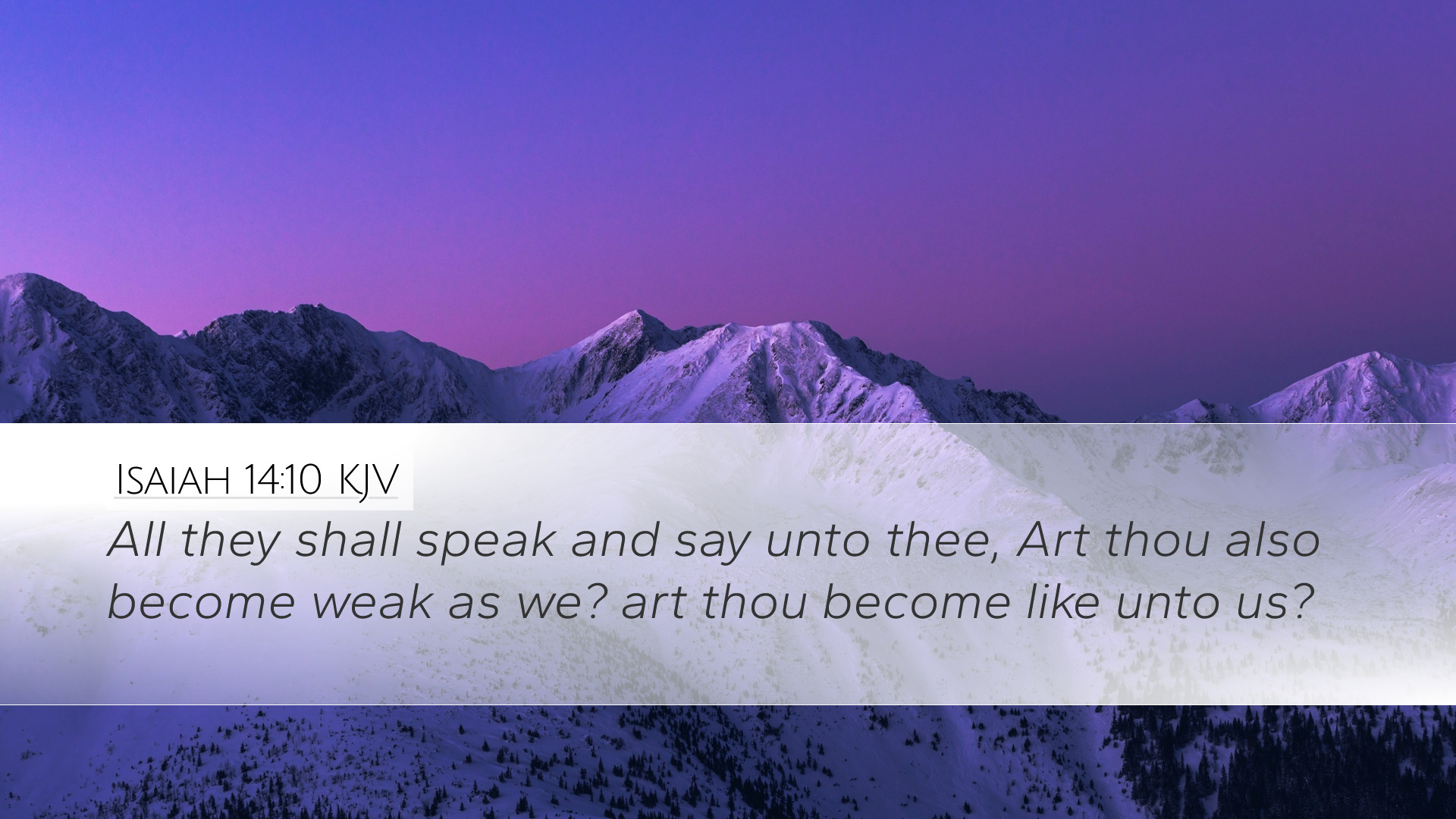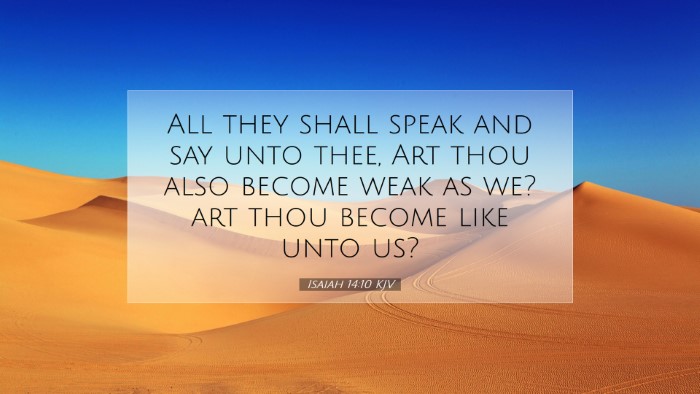Commentary on Isaiah 14:10
Verse Context: "All they shall speak and say unto thee, Art thou also become weak as we? Art thou become like unto us?" (Isaiah 14:10, KJV). This verse is situated within a larger oracle against the king of Babylon, symbolically illustrating the downfall of this proud and oppressive ruler.
Overview of Babylon's Fall
The prophecy in this chapter serves as a taunt against Babylon, a representation of human pride and rebellion against God. Isaiah's message reflects the inevitable judgment that befalls those who elevate themselves against divine authority.
Insights from Matthew Henry
Matthew Henry emphasizes the humiliation of the once-mighty Babylonian king. In his commentary, he notes the communal nature of the mocking phrase, portraying a sense of collective recognition among the nations of Babylon's degradation. The question posed—"Art thou also become weak as we?"—underscores the universal theme of mortality and moral decay.
- Pride and Humility: Henry outlines how pride leads to a fall, recalling the biblical principle that pride goes before destruction (Proverbs 16:18). The fallen king of Babylon becomes a mere shadow of his former glory, highlighting that all humans, regardless of status, are subject to God’s judgment.
- Collective Voice of the Nations: The verse portrays a coalition of nations that had suffered under Babylonian rule, now united in their derision. This emphasizes God’s final vindication and the shared experience of humanity facing the weight of sin and consequence.
Insights from Albert Barnes
Albert Barnes interprets this verse as reflective of the futility of human strength apart from divine sanction. He expounds that the taunt effectively strips away any veneer of power that the Babylonian king might have presumed to possess.
- The Question of Weakness: Barnes highlights the rhetorical nature of the questions posed, which serve to expose the fallacy of the king’s previous self-perception as invincible. It reminds readers that power is transient and contingent upon divine order.
- The Universality of Death: The commentary draws parallels to the human condition, asserting that death levels all, rendering earthly power and glory meaningless. The mockery reflects a profound truth about the equality of all in terms of mortality.
Insights from Adam Clarke
Adam Clarke offers a detailed examination of the socio-political implications of this verse. He describes how the king of Babylon, having oppressed and terrorized other nations, ultimately faces the very fate he imposed upon others.
- The Fall of Greatness: Clarke notes that the once-great figure is now reduced to a state where he can no longer inspire fear; instead, he becomes an object of pity and mockery.
- Spiritual Lessons: Clarke emphasizes the spiritual takeaway that no human authority can evade divine justice, a theme prevalent throughout scripture. This serves as a sobering reminder for leaders and the powerful, that true strength lies in humility and obedience to God.
Theological Reflections
This verse invites deep reflection on the nature of power, authority, and judgment. It prompts pastors, theologians, and scholars alike to consider the implications of human pride and the inevitable consequences that follow.
- Divine Sovereignty: The overarching theme reveals God's ultimate sovereignty over nations and rulers. No matter how formidable a secular power may appear, it exists only by God's allowance.
- The Nature of Mockery and Shame: The communal mockery highlights not only the downfall of the Babylonian king but also serves as a powerful image of justice. It speaks to the reality that divine justice often leads to a public acknowledgment of sin and rebellion.
- Historical Reflection: From a historical perspective, the rise and fall of empires serve as a narrative of God's unchanging character and commitment to truth. The implications of this verse resonate with events throughout history where pride eventually faced destruction.
Conclusion
In closing, Isaiah 14:10 stands as a timeless reminder that all human beings are mortal, and their achievements, stripped of divine support, render them weak and vulnerable. For pastors, students, theologians, and scholars, this passage invites contemplation on the nature of power, the inevitability of divine justice, and the ultimate calling of humanity to humility before God.


